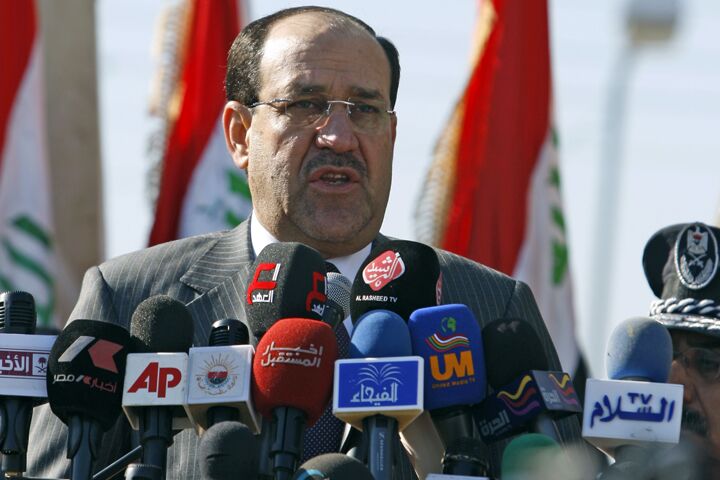
Iraqi Prime Minister Caves to Iran
The Iraqi prime minister has indicated a desire to align politically with Iran, revealing that Tehran is making headway in securing political influence in Iraq ahead of March parliamentary elections.
Iraqi Prime Minister Nouri al-Maliki’s State of Law coalition has announced it will enter into an alliance with the Iraqi National Coalition (inc), formed last August by Iran’s allies in Baghdad in order to secure Tehran’s political interests in the country, according to security consultancy firm Stratfor. In making the announcement, an official in Maliki’s Islamic Daawa party, the main party in State of the Law, explained that “a single bloc cannot form a government. Coalitions with other blocs are therefore necessary.”
“Maliki’s Islamic Daawa Party is using the pretext of coalition politics to justify its decision align with inc, which is led by Ammar al-Hakim’s Islamic Supreme Council of Iraq (isci),” says Stratfor. “But there is no hiding that the development of this coalition is the result of Iranian efforts to maintain a dominant position in Iraq” (January 12).
When the inc was first formed, Maliki refused to join the Iranian-backed political alliance. When Iranian troops occupied an Iraqi oil well in December, we reported that, in part, it appeared to be an attempt by Tehran to put pressure on Maliki to align with the inc. “He could either use the incursion to play the nationalist card and paint his political rivals in isci as Iranian stooges, or he could avoid any Iranian backlash and simply fall in line with Tehran’s wishes” (ibid.).
It appears that Maliki has now caved to Iran. The announcement that his State of the Law will ally with the inc after the elections came shortly after Iran’s foreign minister visited Iraq and met with Maliki and Iraq’s highest-ranking Shiite cleric, Ayatollah Ali al-Sistani.
Meanwhile, as the parliamentary elections near, Iraq’s Shiite-dominated government has begun banning Sunni politicians from running, claiming they have ties to Saddam Hussein’s Baathist regime. Last week, Maliki banned at least 15 political parties from contesting the elections. “It seems evident that Iran’s Shiite allies are involved in—if not behind—the move to sideline key Sunni leaders and their followers in the election,” reports United Press International. This too will help ensure Iranian-backed Shiite politicians are successful in the elections—not to mention a sharp rise in violence.
Iran’s interference in Iraq is continuing in other areas too. Stratfor sources indicate that Tehran may be trying to gain official recognition of its control of the disputed Shatt al Arab waterway, which forms the border between Iran and Iraq. The crucial waterway provides Iraq’s only access to the Persian Gulf. “Iranian ships have navigated the entire waterway with impunity since the Iran-Iraq war,” reports Stratfor. “Now, Tehran wants Baghdad’s official recognition of Iranian rights to the Shatt al Arab, amounting to another symbolic demonstration of Iranian clout in Baghdad” (ibid.).
As Stratfor comments, the Iranians “have entrenched themselves in the Iraqi political, economic and security landscape and are taking advantage of Washington’s decreasing focus on the Iraq war” (ibid.). This is a trend the Trumpet has been pointing to for some years. For details on the significance of this, refer to “When America Leaves Iraq …” and “Is Iraq About to Fall to Iran?”
